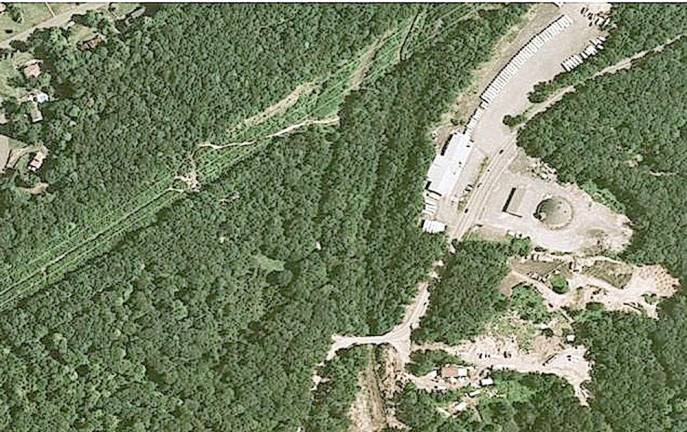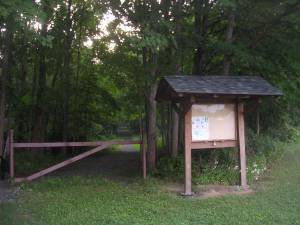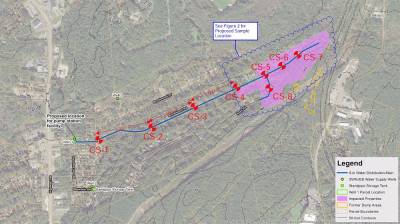Community discusses water line to houses in Mansfield Superfund neighborhood
Byram. The water line may be completed in three years. At a recent meeting the Mansfield Community Action Group fielded questions on testing, contamination, treatment systems, and contingency planning.

The water line to supply houses near the Mansfield Trail Dump Superfund site in Byram Township is in its early states, with funding still unallocated. If all goes according to plan, it will take another three years to complete.
At the Sept. 22 Mansfield Community Action Group meeting, state and federal environmental officials fielded questions on testing, contamination, treatment systems, and contingency planning.
Contaminated groundwater extends from the former dump at the top of the ridge west of the Stanhope-Sparta Road and north to Cowboy Creek.
Diego Garcia, a project manager with the U.S. Environmental Protection Agency (EPA), said its negotiations with Suez Water to connect to its water system are not complete. After the negotiations are finished, he said, the time frame for the water line installation is approximately 36 months.
He said funding for the design is in place, but funding for the water line still needs to be requested.
Garcia said that in order to install a loop for the new water line, the EPA will reach out to property owners along Brookwood Road and Brookwood Drive to obtain access. A four-inch water line needs to be connected to the new line in order to circulate the water.
Another EPA project manager, Selina Rahman, said the agency is now completing a sitewide survey, called the Pre-Design-Investigation (PDI), which is expected to be completed soon. It will include soil sampling near residential properties, drilling, and the installation of groundwater monitoring wells. Rahman said they are waiting for the results before determining the extent of the soil contamination, and would also like to see that the technologies work before completing the design.
Mayor Alexander Rubenstein asked if the proposed piping layout is sized large enough to provide spare capacity. He said homes not currently contaminated that could be contaminated in the future could then be added to the system. Garcia said spare capacity will be built in.
Testing
A resident asked why new monitoring wells were drilled up on the hill. Rahman said the five wells drilled toward the larger dump area are needed to determine the extent of the contamination before the agency is able to move on to pilot studies and treatment.
● Dump Area D: Rahman said the EPA is awaiting results for the more than 100 soil samples taken from Area D. For the remaining dump areas, she said, the agency will inject materials into the ground, known as “amendment injections,” to see if they will treat or remove volatile organic compounds.
● Dump Area A: Rahman said the EPA will complete an injection pilot study with soil vapor extraction for Area A. In this process, vacuum pressure is used to remove volatile and some semi-volatile contaminants from the soil. The agency is verifying the extent of the contamination on this site as well.
● Air testing: Garcia said the air probably will not be tested until there is a Covid policy change, since it involves working in people’s houses.
More questions
● Vapor: Shana Shepherd, a community relations representative for the New Jersey Department of Environmental Protection (DEP), said the agency is monitoring 12 point-of-entry treatment systems installed throughout the neighborhood until the ownership of the property changes. She said three homes have vapor intrusion mitigation systems monitored by the DEP. Vapor intrusion occurs when vapor-forming chemicals migrate from the soil into overlying buildings. Garcia said 20 homes have vapor and contaminated water and will be connected to the water system.
● PFAS and PFOS: Jack Moran asked if the DEP has been tracking PFAS and PFOS chemicals. DEP site manager Amber Permater said PFAS contamination in the wells will be addressed. Garcia said the EPA has not sampled for PFAS or PFOS chemicals, but that Suez Water will install a treatment system on wells to meet the DEP standards. Scott Olson asked if there has been any testing since last September to determine whether high rainfall affected contaminant levels. Garcia said no tests have been conducted in homes because of Covid.
● Contingency planning: Jeanne Moran asked about contingency plans if the well supplying 175 homes on Brook Trail and Mountain Avenue goes down. She suggested bringing Suez Water representatives to Mansfield Community Action Group meetings. Farnaz Saghafi, chief of the EPA’s Northern NJ Remediation Section, said contingency planning is part of any water design, and will address capacity, water pressure, and engineering.
● Water meters: Garcia said the EPA will install meter pits, and Suez Water will install the meters. Additionally, he said, they will not take all the water from the well but return water back into the system.
The Mansfield Community Action Group
EPA community involvement coordinator Pat Seppi said the Mansfield Community Action Group is an advisory group involved in cleanups, along with residents hooked up to the water line.
Seppi said it’s not an EPA group; it belongs to the Superfund community. When the EPA starts construction, the Mansfield Community Action Group will meet with residents every two months.
In the meantime, Seppi said, they will have an action group meeting every three months. Because of the holidays, the next meeting will be held in January.

